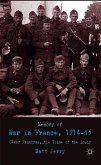Medics learned quickly to ignore standing operating procedures in order to save lives but tensions within infantry units created a paradoxical culture of isolation and acceptance. This groundbreaking work examines training and combat experiences of soldiers working in Battalion Aid Stations and those who went as aid men to the line companies.
Bitte wählen Sie Ihr Anliegen aus.
Rechnungen
Retourenschein anfordern
Bestellstatus
Storno








